#marquees for rent
Explore tagged Tumblr posts
Text
Versatile 6m Spring Top Marquee for Elegant Events - Marquee Eventz
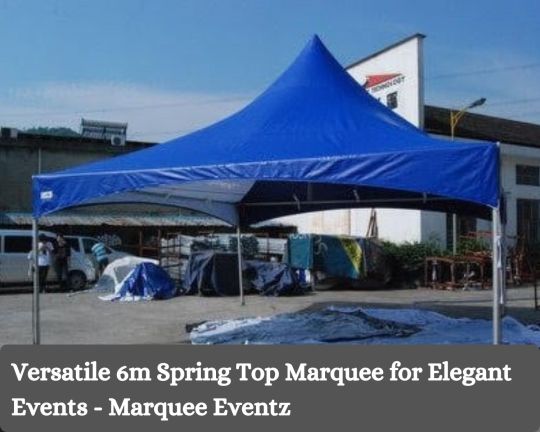
Enhance your event with our stylish 6m spring top marquee from Marquee Eventz. Perfect for weddings, garden parties, corporate functions, and outdoor celebrations, this marquee combines elegance with practicality. The spring top design offers a sleek and contemporary look, while the sturdy construction ensures durability and stability in various weather conditions.
Our 6m spring top marquee provides ample space for dining, dancing, or socializing, making it a versatile choice for any occasion. The easy-to-assemble structure allows for a quick setup, giving you more time to focus on event details. Whether you need an intimate setting or a spacious layout, this marquee adapts to your needs, creating a memorable atmosphere for your guests.
Marquee Eventz is dedicated to delivering exceptional quality and service. Our experienced team is here to assist you in every step, ensuring your event is seamless and successful. Choose our 6m spring top marquee for your next event and experience the perfect blend of style and functionality.
#corporate event hire#hire corporate events#conference venues rental#corporate marquee hire#hire corporate venues#marquee hire near me#marquees for rent#event planner sydney#crockery utensils hire
0 notes
Text
Discover Top Marquee Hire Services in Sydney for Your Next Event
Are you planning a special event in Sydney and looking for top marquee hire services? Look no further than Better Event Hire for all your marquee needs. Whether you're hosting a wedding, corporate event, or private party, Better Event Hire offers a wide range of marquees to suit your specific requirements.
When it comes to wedding marquee hire, Better Event Hire has you covered. Their elegant and stylish marquees provide the perfect setting for your special day, creating a beautiful and memorable atmosphere for you and your guests. From intimate gatherings to larger celebrations, their marquees can be tailored to accommodate any size wedding.
If you're searching for "marquee hire near me," Better Event Hire is conveniently located in Sydney and serves the surrounding areas. Their team of experienced professionals will work closely with you to understand your event needs and provide a marquee solution that exceeds your expectations.
For event marquees in Sydney, We offer a variety of options, including clear-span marquees, pagoda marquees, and more. Their marquees are versatile and can be customized with flooring, lighting, and decor to create the perfect ambiance for your event.
With Better Event Hire, you can rest assured that your marquee hire in Sydney will be seamless and stress-free. Their team will handle the setup and takedown of the marquee, allowing you to focus on enjoying your event without worrying about the logistics.
So, if you require marquee hire services in Sydney, look no further than Better Event Hire. Their top-notch marquees and exceptional service will ensure that your next event is a success. Contact them today to discuss your marquee hire needs and start planning an unforgettable event.
#wedding marquee hire#marquee hire near me#event marquees#marquee hire in sydney#marquee tents hire#marquees for rent#hire marquees
0 notes
Text
3 BR Townhouse Ametta Place Alveo Pasig
Upscale living awaits! Pre-owned 3BR townhouse in Ametta Place by Alveo. 3 baths, maid's room, 2 carports. Luxurious amenities & prime location! East-facing for morning sun. ☀️ Inquire now! #JMListings
📍Ametta Place Mercedes Ave, Pasig, Metro Manila PROPERTY FEATURES TYPE: 3 Story Townhouse📐 Lot: 125 square meters | Floor: 183 square meters🛌 3 Bedrooms🛀 3 Bathrooms🅿️ 2 Carports🛏️ 1 Maid’s room with bath✅ In front of the Clubhouse✅ Main door facing East (morning sun) 🏊♂️ AMENITIES Swimming Pool • 24/7 Security • Car Park • Landscaped Gardens • Children’s Play Area • Basketball Court…
#angeles#Angeles City#angeles city house and lot for sale#angeles city house for sale#angeles city philippines#angeles city subdivision#buy and sell house near clark#Clark#Clark International Airport#deca clark#House and Lot Angeles City#house for sale angeles city philippines#house for sale near clark#Marquee Mall#new clark city house and lot#now residences angeles city pampanga#RENT TO OWN ANGELES CITY#rockwell nepo#sm city clark#SM CLARK
0 notes
Text
Illuminate Your Dream Day: The Art of Marquee Letters
Wondering how to make your wedding day unforgettable? Marquee letters for rent offer the perfect way to illuminate your event with style and charm. At the heart of your celebration, these stunning marquee letters will add a personalized touch to your venue. The exact marquee letters for rent can be customized to spell out names, initials, or even your favorite phrase. Let Alchemy Wedding Designs help create a magical atmosphere on your special day. Ready to light up your wedding? Visit our website and rent your marquee letters now!
0 notes
Text
Rent Marquee Letters for a Memorable Event Display
Planning an event? Marquee letters for rent are the perfect way to make a statement. Alchemy Wedding Designs offers a variety of marquee letters, available in different sizes and styles, to suit any occasion. Whether it's a wedding, party, or corporate event, these letters add a unique and stylish touch. Enhance your venue with marquee letters for rent from Alchemy Wedding Designs. Browse our collection and reserve yours today!
0 notes
Text
Jade Ann Byrne Presents: Neon Nights: The Taco Bell Cosmos
In the vast expanse of a future not wracked by dystopian cliches but painted with the neon glow of endless possibility, a figure stood beneath the celestial marquee of Taco Bell, a testament to the eternal human saga of late-night cravings. Jade Ann Byrne was her name, a contractor to this grand establishment, a caretaker to an army of automatons crafted in her own image. With a cascade of…
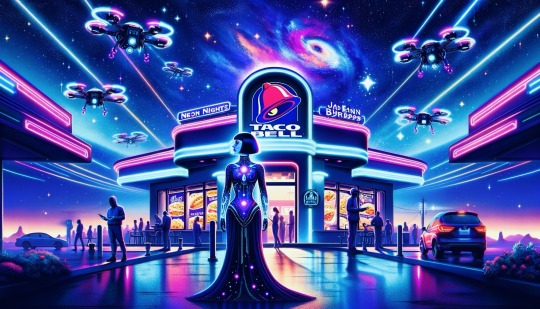
View On WordPress
#Advanced Automation#Awe-Inspiring Technology#Baja Blast Magic#Beeps and Chimes#Cash Register Chimes#Cash Transformation#Celestial Marquee#Cheesy Gordita Crunch#Cosmic Menu#Culinary Alchemy#Culinary Artistry#Culinary Constellations#Customer Indecision#Customer Interaction#Destiny Drumbeat#Digital Hum#Drive-Thru Majesty#Drones and Stars#Drones Delivery Delights#Dystopian Future#Echoes of Flavor#EGirl Drive-Thru#EGirl for Rent#Electric Dusk#Enchanting Attendant#Epicurean Odyssey#Ethereal Refreshment#Fabric of Existence#Fast Food Fantasy#Fast Food Symphony
1 note
·
View note
Text
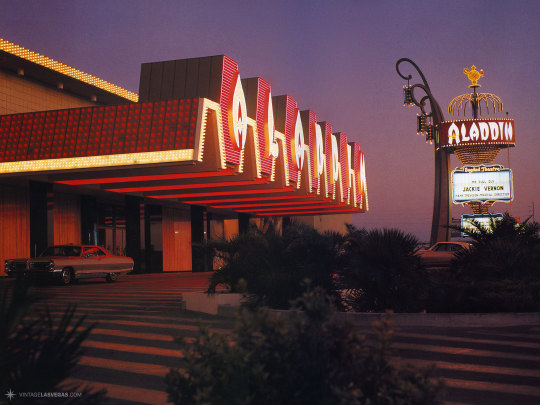
Tally Ho / Aladdin / Planet Hollywood
Aladdin opened in 1966 with one of the Strip's first neon-enhanced porte-cochéres, a freestanding sign featuring a revolving, three-sided marquee, topped with an "Aladdin's Lamp," designed and fabricated by YESCO.
Timeline.
Tally Ho ('62-'65)
'61: Edwin S. Lowe announces plans for Tally Ho non-gaming hotel. In the 40s the land was owned by locals Salton, Rose, and Goldberg. (Alexander & Rebecca Salton, founding members of the Las Vegas Jewish community.)
'62: Dec. 24, Opening of Tally-Ho, hotel and country club with 9-hole golf course. 322 of the 450 rooms open during “preview opening” in Dec. The hotel was alternately spelled Tally Ho, Tally-Ho, and Tallyho.
'63: Oct. 11, Tally Ho closed. “Ed Lowe made no excuses … admits he was dead wrong about a no gambling luxury hotel.” (Hertz, RJ 10/13/63)
'63: Oct., Norman Kaye and Frank Windsor operate the Tally Ho golf course.
'63: Oct.-Dec., The hotel is sold to Kings Crown Inns of America, represented by Floyd and Beryl Cook, Donald Bolinger (Cooks Brothers Trusts, Indiana). Under lease to operators Edward Nealis, Charles Luftig, and partners, Kings Crown Tally Ho's hotel, lounge, and restaurants reopen in Dec. (Duke, RJ 12/20/63)
'64: Construction of a showroom and casino begins in Fall, misses New Year's Eve opening deadline. The showroom and casino are completed in '65, ultimately never opened. (RJ 4/8/64, RJ 5/18/65)
'65: Nealis heads 18 casino applicants of Tallyho Operating Co. who are unable to get approval from Nevada Gaming Control Board (GCB). In later years Jimmy "the Weasel" Fratianno of the Los Angeles crime family claimed he owned a piece of the Tally Ho and was to run the casino. (AP 2/17/65, RJ 11/25/84, Mob Museum 12/8/2017)
'65: Apr. 1, Tally Ho closed for the second time after King's Crown files suit against Tallyho Operating Co. for unpaid rent. Tenants are evicted, property put in control of the owners.
'65: Dec., Tally Ho bought by Milton Prell (Prell Hotel Corp.) from The Cooks Brothers Trusts.
Aladdin ('66-'97)
'66: Aladdin announced. Drawings for redesigned casino and proposed hotel tower unveiled early in the year. Martin Stern, architect. (RJ 1/2/66, RJ 1/17/66)
'66: Mar. 31, Aladdin opened. Freestanding sign and the Strip's first neon-enhanced porte-cochère by YESCO. Primary owners M. Prell, G. Gilbert, and S. Krystal, all former members of Sahara-Nevada Corp. Comedian Jackie Mason opens the 500-seat Baghdad Theatre.
'66: Dec., Prell stops $75k/month payments on the Aladdin and asks that the price be cut. The trustees agree to reduce the sale price to $5.5M. (Dayton, 4/20/72)
'67: Sep. 26, Milton Prell suffers a debilitating stroke which removes him from Aladdin management. (Dayton, 4/20/72)
'68: Apr., Stockholders of Prell Hotel Corp. vote to merge with Parvin-Dohrmann Co., leading to Parvin-Dohrmann take-over the Aladdin.
'68: Jun., Parvin-Dohrmann operation of Aladdin’s casino approved by GCB. (RJ 6/20/68)
'68: Sep., 28, "after the stock trade was finalized, Milton Prell, by this time paralyzed, was told by the new management he had two weeks to get out of the Aladdin." (McKnight, Alexander. Journal Herald, 4/20/72)
'70: Parvin-Dohrmann adopts the new name Recrion, and strips the firm of all its holdings except for its three Las Vegas hotel-casinos: Aladdin, Fremont, and Stardust.
'71: Oct.-Dec., Recrion announces sale to Sam Diamond, P. Webbe, R. Daly, D. Aikin as Aladdin Hotel Corp. Diamond announces plans for hotel tower.
'71: Entertainment director James Tamer is involved in secretly managing the casino and directing the skim, according to later conviction.
'74: Aladdin investigated by GCB for issuing comps to organized crime figures.
'74: Groundbreaking for the “Tower of Majesty” high-rise, and theater. Lee Linton, architect. Years later in '83, Linton and Aladdin attorney Sorkis Webbe are each convicted of tax fraud in relating to a kickback scheme during the '74 expansion.
'76: Jul., Tower and Theatre for the Performing Arts opened; new porte-cochère by Charles Barnard, Ad-Art; original sign replaced; all financed by Teamsters Central States Pension Fund loan.
'76: Mae Ellen George buys 24% of the hotel, relying on advice of Tamer.
'78: Aug. 3, Detroit federal grand jury indicts Tamer, Aladdin GM James Abraham, Aladdin casino manager Edward Monazym, and Charles Goldfarb (denied a license in ’71) of conspiring to allow hidden owners to exert control over the resort. Owners of the Aladdin at this time are Webbe (34%), Diamond (23%), Mae George (19%), Daly (14%), John Jenkins (8%), and George Morse (2%). (RJ 8/3/78)
'79: Mar. 13, Tamer, Abraham, Monazym, and Goldfarb convicted.
'79: Aug., GCB closes the resort; U.S. District Judge Claiborne opens it hours later, “until a mob-free buyer could be found.” (German, RJ 9/20/2021.)
'80: Jan., Ed Nigro gains a court-sanctioned takeover of the Aladdin after he and Johnny Carson sign an agreement to buy the property for $105M. The deal falls through.
'80: Jul. 10, GCB revokes Aladdin's license and the casino is closed; hotel remains open.
'80: Oct. 1, Casino is reopened after Ed Torres and Wayne Newton buy the Aladdin for $85M.
'82: Jul, Torres buys Newton's shares of the Aladdin.
'84: Feb., Aladdin placed under bankruptcy protection after a Teamsters Pension Fund forces foreclosure.
'85: Jan. 22, Ginji Yasuda buys the Aladdin for $54M; casino closed during Yasuda licensing.
'87: Apr. 1, gaming reopens.
'89: Aug., Yasuda, failing to reveal the source of millions in loans, loses his gaming license; Aladdin forced into bankruptcy.
'89: Sep., Court appointed trustee Jack Fidelman, and WDT Associates (Wm. and Tim Dougall, Larry Bertsch) take over operating the hotel. Aladdin remains in bankruptcy through the early 90s.
'91: Jun., Property title transferred to Bell Atlantic Tricon Leasing Corp when no buyers meet the minimum bid.
'92: Jun., Aladdin emerges from 3-year bankruptcy, control is given to Joe Burt and his JMJ management team on a 12-year lease with Bell Atlantic Tricon.
'94: Dec., Jack Sommer, Signman Sommer Family Trust, buys the Aladdin for $80M. "When the family trust sold a major New York property in '94, Sommer needed to find a real estate investment for the proceeds to avoid substantial capital-gains taxes. The Aladdin was on the market at the time." (Simpson. RJ 8/13/2000.) Other potential buyers included Donald Trump.
'97, Nov 25: Aladdin closed. A new hotel-casino to be built on the 35-acre parcel.
'98, Apr 28: Aladdin tower demolished. Former Tally Ho rooms later demolished; Theater remains.
Aladdin (2000-2007) Planet Hollywood (2007-)
2000: New build of the Aladdin. Mall opens 8/17/00, hotel and casino delayed, opening 8/18/00. Cost: $1.1B.
2001: Sep., Aladdin files for bankruptcy.
2003: Aladdin sold for $635M to OpBiz investment group led by Planet Hollywood CEO Robert Earl. Sale finalized 9/1/2004.
2007: Apr. 17, renamed Planet Hollywood.
2009: Harrah’s Ent. purchases part of the $860M mortgage, takes full ownership in Feb. 2010. Harrah’s later rebranded as Caesars Entertainment.
Photos of Tally Ho | Photos of the Aladdin
Headline photo: Undated, circa '68, from The Magic Sign by Charles Barnard.

Circa Feb.-Mar. 1966: The hotel was open before the casino. Installation of the sign is beginning. Photo: Las Vegas News Bureau.




Mar. 1966: Sequence of photographs showing YESCO’s revolving, three-sided Aladdin pylon structure being pieced together by dual cranes ahead of their opening on the 31st. Ad-Art collection, from Charles Barnard’s The Magic Sign.

Undated, Las Vegas News Bureau.

3/31/66 – Opening night. Four men holding scissors are Bill Braire, Las Vegas Mayor Oran Gragson, Milton Prell, Las Vegas Sun Publisher Hank Greenspun. Las Vegas News Bureau, LVCVA Archive.

“Aladdin Casino was the first Las Vegas hotel to integrate major sign elements and neon into its porte-cochère. Sign modules were incised into the leading edge of the projecting canopy and wrap-around grids of incandescent lamps followed these contours back to the entry.” - Charles Barnard, The Magic Sign. Photo: Las Vegas News Bureau.

Postcard c. '66-'68

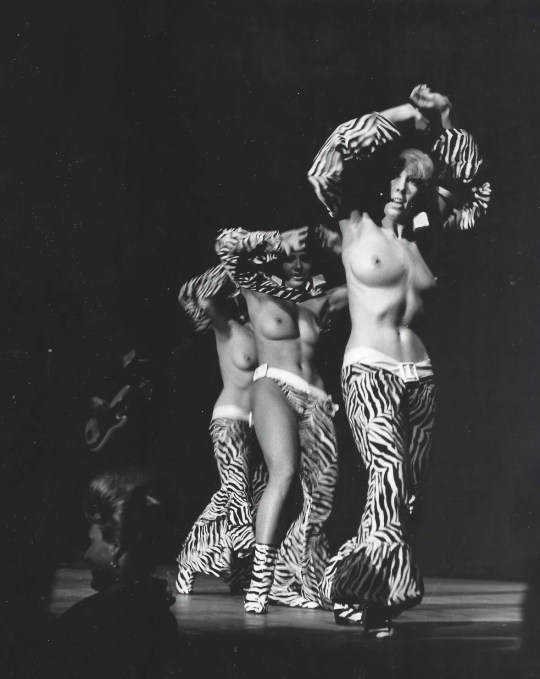
Showgirls at the Aladdin, 1966. Las Vegas News Bureau.
Timeline sources.
Previous landowners: C.D. Baker Map of Las Vegas Valley ’40; Alexander Salton. UNLV Special Collections & Archives.
Tally Ho: Tallyho Preview Attracts 3500. Review-Journal, 12/28/62; Tallyho Hotel Closes. Review-Journal, 10/11/63 p1; Murray Hertz. Future of Tallyho Raises Questions. Review-Journal, 10/13/63; Gordon Kent. Tally-Ho Hotel Sold. Review-Journal, 11/1/63; Forrest Duke. New Tallyho Sale Deal. Review-Journal, 12/20/63; Tallyho Plans $1 Million Show. Review-Journal, 4/8/64; Associated Press. Gaming Board Refuses Tallyho Casino License. Review-Journal, 2/17/65 p1; G. Kent, F. Duke. Strip Hotel Closes. Review-Journal, 4/1/65 p1; Tallyho Sues Owners. Review-Journal, 5/18/65 p1.
Tally Ho and Aladdin sales covered in a series by Keith McKnight and Andrew Alexander for The Journal Herald, Dayton OH. Welsh confirmed with crime figures. Journal Herald, 4/20/72; Firm with crime ties linked to casino deal. Journal Herald, 4/21/72.
Aladdin: Associated Press. Gamers Approve. Review-Journal, 6/20/68 p1; Associated Press. Firm adopts new name: Recrion Corp. Reno Gazette Journal, 12/14/70; Lou Miller. Aladdin Hotel sold. Review-Journal, 11/8/71; Jerry Ralya. New Aladdin Corporation seeks license. Review-Journal, 12/29/71; Aladdin execs indicted. Review-Journal, 8/3/78; AP. Las Vegas architect sentenced to prison. Review-Journal, 3/8/83; AP. Webbe convicted. Review-Journal, 6/19/83; Jane Ann Morrison. LV Casinos Targeted in Money Laundering. Review-Journal, 11/25/84; Aladdin Hotel's history spans 30 years. Review-Journal, 1/5/94 p3; Dave Palermo. Aladdin Hotel finally sells. Review-Journal, 12/9/94 p1; History. Review-Journal, 11/23/97 p14; Jeff Simpson. Aladdin owner faces music. Review-Journal, 8/13/2000; Chronology of the Aladdin hotel-casino. Las Vegas Sun, 8/18/2000. John L. Smith. Sharks in the Desert. Barricade Books, 2005; David Schwartz. Jimmy The Weasel Fratianno. themobmuseum.org, 12/8/2017; Jeff German. The Genie in the Lamp, and Close the Place Down. Review-Journal, 9/20/2021.
92 notes
·
View notes
Text
Watch Where You're Going
Two trans people talk about life while one of them finishes her shift at the local video store. 2k words. Originally published in Olit Magazine. Content warning for discussion and depiction of transphobia.
“I’m not necessarily saying it’s a bad movie, I just think it’s in poor taste.”
“What makes you say that?”
Lake flipped the hatch shut on top of the lightbox and took a step back. Lit from behind, the new poster depicted an image of a shimmering red wave the height of a skyscraper looming over a seaside metropolis. The title, printed in screaming orange block letters, read “HEATWAVE.” Then, in smaller letters near the top: “It’s too late to run.”
“I dunno, doesn't it feel a bit tone-deaf to you? Like, people are dying, dude.”
A few steps back, Freddie picked idly at some flaking plastic on one of the DVD cases. “Or is it timely? It's basically commentary on climate change."
“Climate change commentary should probably have fewer explosions and CGI of people being vaporized.”
“Yeah, I guess. I do think the Rock was really good in it, though. Did you watch any of his marketing interviews? He’s basically an activist at this point.”
“Okay, now you’re antagonizing me on purpose.”
“Am I antagonizing you, or am I winning this argument?”
Lake shot them a look as she rolled up the former occupant of the poster display. “If the Rock wants to be a climate activist, then he can get an environmental science degree like the rest of us. Go pick a movie or I’m gonna make you salt the sidewalks.”
“I literally don’t even work here.”
“All the more reason to go pick the movie.”
The store, as usual, was empty. Muted screens flickered movie trailers over the vast expanse of green low-pile carpet, the rows upon rows of gray shelves packed with plastic anti-theft DVD cases. Plate glass windows at the front of the store looked out onto a desolate parking lot, wet pavement glittering in the light of the towering marquee sign.
Stowing the rolled-up poster under the front counter, Lake looked at the clock. Nine-thirty. Still an hour and a half before she could close, and no one besides Freddie had walked in the door since eight. Standard traffic for a weeknight—on nights like these, the cash deposits she took to the bank after closing were sometimes less than she got paid to be there. Oh well, she thought. At least my homework gets done.
“How about this,” called Freddie from across the store. Unseen between the high shelves, a hand shot up above them holding a DVD. Lake squinted to make it out.
“No, not that. Don’t pick something that someone would conceivably try to rent while we’re watching it,” said Lake. “I hate when people do that.”
“Okay, something else then. What about…” There was a long pause.
“Hurry up or I’m unmuting the ad reel.” Lake opened the cabinet that housed the DVD player and grabbed the remote. “I’m gonna do it!”
“ALRIGHT, Jesus, I’ll just pick one.” A second later Freddie emerged from the aisles, strode to the front and slapped a movie down on the counter. “Free her.”
With a click, Lake picked the magnetic pin out of the center of the case and removed the disc. “Priscilla,” she said. “Good choice.”
“I’m in the mood for some gay shit. Put it in.”
The movie blinked onto the screens simultaneously, spaced twenty feet apart around the perimeter of the store. While opening credits rolled, Freddie dragged two decorative chairs no one was supposed to sit in up to the registers, and the pair of them sat down.
“You brought snacks?”
“Sure did,” said Freddie, scooting a plastic bag across the carpet with their foot. “It sat in my car overnight so the candy might be a little stiff, but it’s still good. Nothing perishable.”
“Thanks for the heads up.” Lake reached inside and fished out a pack of gummy worms. “Want a Code Red or something? We had a bunch that just expired.”
“I’m good, I got coffee before I came. Probably gonna have more when I get to work.”
“When’s your shift start?”
“Eleven, I know that’s when you close so I’ll bounce before you have to lock up.”
“Didn’t you just work earlier?”
Freddie shrugged. “Yeah, noon to eight. Such is the grind.” They plucked a worm from Lake’s lap and chewed thoughtfully. “Days like this are such a bummer. Too short of a break between jobs to go home and sleep, but too long of a break to sit in my car.”
“That’s what I’m for,” said Lake. “I’m like the truck stop of people. Rest your bones, take a shower.”
Freddie just laughed. On the screens, a man in the crowd whips his beer can at Hugo Weaving. He tumbles to the floor, laughter filling the room as he rights himself and staggers away. Backstage, he pulls off his wig and cradles his head in his hand, makeup settling into the somber creases of his face.
“Did I tell you some guy flicked his cigarette butt at my face the other day,” said Lake, staring up at the screen. “While I was getting gas.”
“Jesus, really? That’s horrible.”
“It’s fine. It’s not the worst thing anyone’s ever done to me. The look on his face hurt more.” She gestured to her own face, drew up her lip to show what she meant. It made her feel ugly to even approximate. “The sneer, you know. You get the sneer.”
“Yeah. My boss at the call center does it to me sometimes when he thinks I’m not looking.” Freddie folded their arms over their chest. “Haven’t told anyone. They’d probably just fire me to save HR the trouble.”
“I’m sorry.”
“Yeah. Me too.”
They fell silent as the movie filled in the gaps. Headlights flashed at their backs as cars on the road drove past, less and less frequent by the minute. Someone shoved a handful of DVDs through the drop slot with a metallic rattle but didn’t come inside. The gummy worms were depleted, and Freddie started in on a bag of spicy chips. On-screen friendships develop even as homophobic graffiti defaces the film’s titular bus between stops through the outback.
“Do you ever want more?” said Lake after a while.
“I’m good on snacks I think.”
“No, I mean—more from life.” She turned in her seat. Freddie was still looking up at the screen, a film of peach fuzz visible on their face in profile, whiskers turning gold in the light. “Do you ever feel like… I dunno. Like it’s all over?”
“You’re in college. Everyone feels that way in college.”
“Did you feel that way in college?”
Freddie shrugged, wiped red powder from their fingers onto their jeans. “Sure I did.”
“And now?”
“Now I don’t really care.”
“Okay. Elaborate on that.”
“Alright.” Freddie licked their fingers and turned to face her. “Here’s the thing: in college, everyone wants something from you. And they expect something from you. And they expect you to want something, and to put effort into going for it. But once you’re out of college, the number of people around you who give a shit about that stuff drops pretty dramatically. Right now you feel like it’s all over, but you haven’t even gone anywhere. Nothing has even started.”
“What if I don’t even know what I want?” Lake thumbed a buttonhole in her cardigan. “I’m getting this degree, but now that I’m almost done, I don’t even know if I want to do anything with it.”
“You see me using my degree? I work nights at a gas station, babe.”
“But do you like that?”
“I like it enough,” said Freddie. “I like that my boss doesn’t care if I sit and draw as long as customers get helped and checklists get done. I like that when I’m done with work I get to go home and make art and play with the cat and no one can tell me what to do. Granted, I don’t like the call center,” they added, “but the money’s fine for now. It’s just a job. As long as I get to make my art and be the most authentic version of myself, then I don’t care what other people think.”
“That doesn’t feel like giving up to you?”
“Not really.” They hesitated. “You know what would feel like giving up? If I stopped making art so I could like, go into marketing. Or if I detransitioned so I could be more hireable. I’m not interested in compromising what I care about so I can want what other people think I should want.” Freddie paused again, rubbed their eye with the heel of their hand. “Or, you know, maybe I’m just a burnout, and I’m only saying that to make myself feel better. I don’t really know.”
The two of them fell silent for a while. The movie played on. The door alarm dinged and Lake jumped to her feet, Pavlovian customer service response in action. He didn’t need any help, said the customer, and he returned to the register after a few minutes with a copy of some action blockbuster from last year and a porno. She felt his eyes on her as she pulled up his account and rang him up; a long, curious stare, like he was trying to figure something out.
Once he’d left, Lake glanced at the time. “You can hang out up here while I do the rest of these returns,” she said, “but you’ll probably want to head out soon. Almost closing time.”
“Already? Damn, I should have picked a shorter movie.”
“It’s cool. We can always watch the ending another time.”
“Definitely.”
Movies were scanned, then re-pinned and restored to their usual locations around the store. While she made the rounds, Lake watched out of the corner of her eye as Freddie tidied up the registers without being asked, even tying off the trash and leaving it by the door for her. When she came back to get Priscilla, she hesitated over the “eject” button, watching as the climax of the movie played out. The heroines climb up the cliffside, sweating and squinting in the sun, red dust coating their boots. At the top, they catch their breath. They are beautiful and tiny against the backdrop of the canyon, drag regalia resplendent in the setting sun. The camera pulls back, and back.
Click. The screen went black, and the player spat out the disc.
Ten minutes before close, Lake walked Freddie to the door.
“Thanks for hanging out with me.”
“My pleasure. Just doing my part to keep you from dying of boredom.”
“Much appreciated.” Then: “Um, I wanted to say—I don’t think you’re a burnout. I’m sorry if I made it seem like I did.”
“It’s cool. I know you didn’t mean it that way.” They took a deep breath. “Anyway, let me get out of here before I make myself late. Have a good rest of your night, Lake.”
“You too, text me later.”
“Will do. See ya.”
Eleven o’clock came and went. A flurry of snow began to fall outside, downy flakes disappearing on contact with the asphalt. Lights off, alarm set, door locked, and then Lake took the drive to the bank. The cash envelope for the day contained less than forty dollars, snapped up into the overnight drop box with a clank.
A mile down the road, Lake turned into a different lot, parked near a pump and turned off the engine. Then, in the silent car, she gazed through her windshield at the warm-lit interior of the gas station. Freddie was inside, alone at the register, staring down at the counter. A pencil moved in their hand, cutting broad strokes across a sketchbook page. They didn’t look up, focus falling completely on their work even as Lake watched them through the window.
The sky was dark and close, snow falling fast like hyperspace stars. There probably isn’t a right answer to anything, she thought, and then it was late, and there was nothing to say. Lake drove home and went to bed, and dreamed she was climbing a mountain.
#writing#mine#original fiction#writeblr#short story#RIP olit and thank you for publishing this in the first place#this piece is uncharacteristically wholesome as far as my writing goes so i hope you enjoy#it's also a little older so it does make me cringe to read now but that's just my perception. anyway
17 notes
·
View notes
Text
Cause of Action 3
Warnings: dark elements, noncon, age gap, other dark elements. Proceed with caution.
Note: thank you for waiting! Please let me know what you think as it helps me a lot with ideas and I love interacting with you all.
Part of The Club AU

Mr. Barber –Andy– pulls into a spot along a street you recognise. You won’t voice why you find it familiar, that’s probably better left unsaid. Your nightlife is hardly relevant to a law office.
You get out and wait as he pays the parking pass kiosk and puts the slip in his windshield. He looks at his watch again. His apparent anxiety is adding to your own. You walk with him up the pavement and hesitate as he turns to cross. Oh, it can’t be.
You look up at the club’s marquee and repress any twitch of guilt. Of course you’d been there before, a couple times with friends, but you’re really not big on the scene. Still, you wonder what he would think.
It’s early. Door’s have yet to open but it doesn’t hinder him from walking along the brick front of the building and knocking on the double doors. You chew your lip. Your brain isn’t processing this properly. You have no idea what’s going on.
Andy looks at you and gives a rocky chuckle as he rubs the back of his neck, “client is a friend of the owner.”
“Ah,” you give a short nod.
“Not really our typical meeting place but he’s hard to pin down,” Andy explains, “we shouldn’t be long.”
The door opens and you’re greeted by a man with an imperious curl to his lips. Sleek black hair combed back so the spiraled ends cluster behind his ears. Andy gives a tilt of his head.
“Uh, Laufeyson,” he points at him unsure, “I’m here for Hansen?”
“Ah, yes,” the man, Laufeyson lets out a long exhale, “I should charge him rent with how often he frequents. Come.”
He steps back and Andy catches the door, holding it for you until you precede him inside. The dark-haired man considers you with an air of discernment. You squirm as you glance around. This place looks a lot different with the lights on.
“Oh, this is my intern,” Andy supplies, “showing her the reins.”
“Hi,” you greet and offer your name. The man doesn’t acknowledge you.
“This is Loki, he owns the place.”
“Doors in an hour,” Laufeyson intones dismissively as he turns on his heel, “I’m certain you’ll find your way.”
Andy sniffs but says nothing. It isn’t until Loki is halfway up the stairs that he even moves. Andy shifts into motion, gesturing you into the main room of the club. He halts and looks around before pointing out another staircase; that one twisting and metal.
“I think it’s just up there,” he says as he continues forward and you scurry to keep up.
“So, uh, what kind of case exactly is this for?” You wonder as he stops at the bottom of the stairs and again waits for you to go first.
“Standard lawsuit. Employment contract breach. Hopefully, we can keep it to a deposition.”
“Mmm,” you hum thoughtfully, “is this the employee?”
“Employer,” Andy tuts, “burden of proof really isn’t on us, so there’s that.”
“Right,” you don’t head down the hall until Andy directs you onward to the door with a golden snake on it, “if he’s doing business here…”
You let the thought drift. It’s not really your place to say.
“You’re not wrong,” Andy says, “I’ve heard wild stories about this place.” He reaches past you and taps on the door with his knuckles, “an ex of mine, she apparently came here, liked to hook up with strange men…”
“Oh?” You blink but add no comment.
“Meanwhile, when I was married, my wife accused me of coming to places like this while I was working overtime to pay the mortgage,” he scoffs, “well, I guess that’s not important. Sorry. Just… this is weird.”
“A little,” you agree as his vocalisation of the fact eases the tension.
The door opens and you’re met by a man with a rather bristly accoutrement across his lip. You almost snort at the mustache but think better of it. It wouldn’t do well to mock this man’s fashion sense. He is a client after all and despite the venue, this is still a professional meeting.
“Barber,” the man greets as he leers down at you, giving a wink, “you brought some fun?”
“Hansen,” Andy growls back, a silty tone that makes you shiver, “my intern. Play nice.”
“Ah, I’m always nice,” he smooths a hand over his hair before offering it, “how are you, sunshine? Lloyd.”
“Um,” you reluctantly shake his hand and give your name, “I’m fine.”
“Fine, well, let’s fix that, come in,” he backs up and turns, strutting away in his tight white pants and shimmery satin shirt. He isn’t really dressed for business. “Barber, you hound, you finally got me. You better make it fast.”
He grabs a bottle and pops the top, “you know, I have a long night ahead of me.”
“I told you I had noon free–”
“Noon? I was still waking the snake–”
“Hey, cut it out,” Andy warns.
“Sorry, sorry,” Lloyd looks at you with a smirk, “she looks old enough–”
“She’s not here for that. So let’s get to it. I need the records of employment. What you sent me is a cocktail napkin and a snapchat conversation. That’s not gonna cut it.”
“Oh really? Like I said, it wasn’t really a contract. Not in the way she’s saying. Bimbo,” he scoffs as he pours a shot, then another, “it’s simple, there is no case.”
“If there wasn’t, I wouldn’t be here.”
Lloyd nears and offers one of the glasses. Andy sighs and stretches an arm in front of you to block the other man, “what are you doing?”
“You got this sweet little piece working late. I’m just tryna make it worth her time. You seem like the stingy type,” Lloyd sneers, “one shot won’t hurt.”
“She’s on the clock.”
Lloyd’s brows rise and he snorts. He doesn’t say whatever thought dimples in his cheek.
“Loosen up, you want some? I can get some scotch up here, old man.”
“I drove.”
“Uber,” Lloyd insists, “don’t be a fucking cock block.”
He elbows past Andy and presents you the shot, “there ya go, sweet heart. The good stuff. Top shelf. Whatever he pays you isn’t enough to get you a single ounce.”
You stare at the shot, then Andy. You know you shouldn’t and you really don’t want to drink. You tend to stick to a single drink on your nights out and dilute it with as much water as you can get.
“Um, thanks, but–”
“But nothing. Don’t let the geezer get you down.” He holds the shot almost in your face, “take it, sweet pea. Trust me, you’ll thank me.”
Andy nudges you gently, “it’s fine,” he grumbles under his breath as he takes out his phone, “I’m not leaving until I have something, Hansen.”
“You know what, I’ll give you better than hard evidence, something even harder,” Lloyd snickers as you take the shot but make no move to drink.
Andy backs off, rubbing his cheek as he turns his back to you. He’s angry. You can tell. You’re starting to wonder why he even brought you if he knew this man was like this. Maybe it’s good to get a taste of the difficult ones.
“Cheers, baby,” Lloyd clinks his shot glass against yours, “bottoms up.”
#andy barber#dark andy barber#dark!andy barber#andy barber x reader#defending jacob#drabble#series#au#the club#cause of action
198 notes
·
View notes
Text
Spacious 8m Framed Marquee for All Occasions - Marquee Eventz
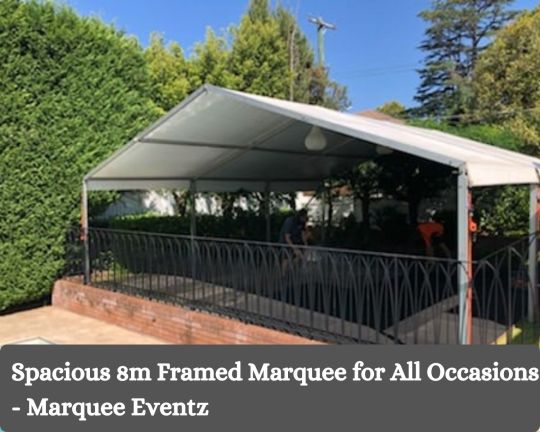
Transform your outdoor event with our expansive 8m framed marquee from Marquee Eventz. Ideal for weddings, corporate events, festivals, and large gatherings, this marquee offers both elegance and functionality. The robust frame ensures stability and durability, while the high-quality materials provide a sophisticated appearance that enhances any event setting.
Our 8m framed marquee is designed for versatility, accommodating various layouts and configurations to suit your specific needs. Whether you require space for dining, dancing, or presentations, this marquee provides ample room to create the perfect atmosphere. The easy installation process ensures a seamless setup, allowing you to focus on the finer details of your event.
Marquee Eventz is committed to delivering exceptional quality and service. Our dedicated team is here to help you every step of the way, ensuring your event is a memorable success. Book our 8m framed marquee today and elevate your outdoor event experience to new heights!
#hire corporate venues#hire corporate events#conference venues rental#corporate marquee hire#marquees for rent#marquee hire near me#corporate event hire#event planner sydney#party crockery hire
0 notes
Text
Top Marquee Hire Services for Weddings and Events Near Me
Looking for top marquee hire services for weddings and events near you? Look no further! Our experienced and professional team offers a range of beautiful and customizable marquees to suit any occasion. From elegant wedding receptions to corporate events, we have the perfect marquee solution for you. Contact us today to discuss your requirements and make your event truly special.
0 notes
Text
Spotify Wrapped Writing Prompt
Look, I was pretty sure someone asked for this, but I can't find the ask and I've written it and I think I'm a little bit in love with it, so sharing anyway.
-----
#66 - Hard To Handle by The Black Crowes
Eddie hates waiting in line. Life is too short (a lesson he learned the hard way) for standing around waiting for things. With the exception of getting gig tickets or getting into those gigs. Both valid reasons to wait.
Maybe less so this gig.
It’s not really his scene, there’s more than a few poseurs in the line, but Kyle likes the band and, as so often is the case with them, Kyle gets what Kyle wants.
Eddie gets… a little less.
He’s at the stage in his life, at the grand old age of twenty four, where he craves companionship over sex. While his friends are still fucking around, literally in some case, Eddie needs to settle. Needs the peace and stability. And he’d never, ever, admit it to anyone, but he needs to be taken care of. The thing is, thats a hard sell in your early twenties. But Kyle got it. Got him. His need to be looked after. The fact that he had scars and trauma and health issues from ‘an accident’. He was okay with all that.
For a while, anyway. Things change though, right?
Eddie earns shitty money, so Kyle pays more of the rent, and he gets the sense more and more that one wrong move, one missed pay check, or fuck, if he lost his job, Kyle would throw him out on the street. What’s love got to do with it? as Tina would say. So he finds himself toeing the line more and more. Doesn’t argue about the stupid shit, let’s Kyle have his way more and more. Just little things.
Little things mount up to be big things, though.
So yeah, he comes to gigs he’s not really into and he sees bands he might not have bothered to, and he listens to music thats okay, but it’s not him, you know? Its like, him adjacent.
And all of that is why he’s standing outside the Ritz Music Hall in Indianapolis, freezing his balls off, waiting to get in to see The Black Crowes.
Kyle got to talking to some people in the line, and Eddie just smiles and makes out like, yeah my god, great band, like he wouldn’t have been arguing a few years back about how Iron Maiden were clearly the superior artists. He doesn’t have the fight in him for those kind of arguments anymore. So he nods and smiled, hands shoved in the pockets of his shitty old leather jacket, scarf pulled tight around his face. Tight around that scar.
He zones out and he’s looking around, people watching, killing time. Eyes up and down the line as he keeps moving to keep warm. And he spots it, about thirty people ahead of him, that swoop of brown hair that he knows oh so well.
No fucking way.
He tells Kyle he thinks he’s spotted a friend, won’t be a second, and all that, and then heads down the sidewalk.
“Steve?”
Chestnut Swoop spins to look at him, and he didn’t even need him to, he knew who it was. Knows that hair anywhere. Those shoulders, the way he carries himself, the way he moves. Eddie knows it all.
“Eddie? Holy shit!”
Eddie nearly gets knocked off his feet, Steve lunging toward him and practically pulling him off the ground into a bear hug. He’s kind of lost for a second, before he wraps his own arms around Steve and squeezes back. He smells good, and Eddie recognises his cologne. Eternity for Men. He picked it out for Kyle, and Kyle just scrunched his nose up and walked off. Steve’s wearing it. Something Eddie would have chosen.
Steve pulls back from him but hangs on to his arms, like he’s taking him all in. Eddie’s heart is thundering in his chest.
“What the fuck are you doing here? Actually, scratch that, where the fuck have you been?”
“Here, in Indy… mostly. It’s a long story.” Steve raises an eyebrow but Eddie plows on, doesn’t give him a chance for a follow up question. “What about you man, here to see... “ he points to the marquee up above.
“Yeah,” answers Steve. “Yeah, there’s a few of us from work and, fuck! Robins here! She’s gone to pee,” Steve looks around, as if Robins pissing in the street, “uh, somewhere. Man she’s gonna lose her shit when she sees you.”
They talk, and Steve introduces his work friends and Eddie can’t help himself, he’s checking them out trying to work out which one is Steve’s girlfriend. Robin screeches “Eddie!” as she runs up the street, practically throws her self at him. He gets the overwhelming urge to cry. He’s feels like an idiot.
“Eddie? Come on man, we’ll lose our place.”
Kyle comes up behind him, looking mildly pissed. He’s eyeing up Steve’s friends and then his eyes are all over Steve. There’s no way he doesn’t recognise him. Eddie has a photo album that he started putting together in 1986. Pictures of the kids, of Wayne, of Robin and Nancy and Steve. There’s one of the four of them sitting on the porch of Wayne’s new trailer, beers in hand, all cheering at the camera as Wayne took the photograph. Eddie and Steve practically in each others lap. That one is in a frame. Kyle clocked something there straight away. Eddie gave him nothing. Close friend, he said. Kyle huffed, sure. Subject closed.
It was the weirdest thing. And it wasn’t just trauma bonding, or whatever the fuck Robin called it. The trauma got them together, maybe, threw them altogether on a big spin cycle and spat them out, but Eddie and Steve clicked. They’d have clicked without it. So easy to say opposites attract, but they weren’t that different really. Not when you scratched the surface.
And it wasn’t really anything but it wasn’t really nothing, either. There were late nights under blankets, and well you’re staying over and it’s cold so you may as well climb in the bed, dude, and I can’t sleep wanna go for a drive? and arms thrown around shoulders, and sitting side by side, knees touching. There were pinkies linked, hands over hands, lying in bed crying, foreheads touching. Nothing, but everything.
They had two good summers before Steve said he was moving away. Nothing for him in Hawkins, apparently. Eddie couldn’t hide the hurt, so he ended up burying it in the back of his van with his backpack and his guitar and left town first. Said goodbye to Wayne and just took off. He came back for holidays and birthdays, but if Steve or Robin did the same, Eddie never knew.
And now they’re outside the Ritzy Music Hall in Indianapolis and it’s November and its cold and Kyle is standing there like he wants to start swinging his dick. And Eddie? He just wants to grab Steve by the hand and run. But he doesn’t. He doesn’t run now. He follows.
“Um, I should get back,” he says.
Steve’s brows dip, like he’s confused. “Fuck no! Cut in with us. I’m not letting you out of my sight, dickhead.” Steve laughs but it’s stiff and his eyes don’t really leave Kyle.
“We’re good, thanks.” Kyle throws his arm over Eddies shoulder, pisses on his territory for all to see and starts to drag him away, but Eddie pulls out from under him.
“Just a second,” says Eddie. Kyle cuts him a look, sharp and beady. Eddie reaches into his pocket, finds a scrap of paper. No pen. Shit.
“Ooh, yes, pen! I have one!” says Robin, and he loves her, and fuck he’s missed her so much. And her hair is different, and she looks so cool. It’s only been three years and he’s missed it all.
He jots his number down and hands the paper over, before snatching it back and adding another.
“Top is mine, or Kyles, I guess,” and he’s so embarrassed at that, “but the bottom one is Waynes. He’d love to hear from you.”
And so its goodbye, and call soon, and he’s back in line with Kyle and Kyle is in a shitty mood now. Declares how he just wanted to enjoy his night, and well apparently Eddie running into the best friends he ever had, the ones he ran away from so they couldn’t hurt him first, well that just fucked Kyle’s night right up.
They’re in, eventually, and the band come on, and now Eddie at least has noise to drown out the thoughts ticking over in his head. He feels suddenly so empty, so cold. He has work in the morning, and he’s starting early and he could feign any number of ailments at this stage, but there’s this terrible little thought at the back of his mind that he could end up with all his shit thrown out in the street.
The band play a slow song, one he knows is called Miserable and deep inside he’s laughing at himself. Kyle is swaying away, one step away from getting his lighter out by the look of him, so Eddie taps him on the shoulder and tells him he’s going for a piss.
There’s another line at the bathroom, everyone else jumping out during the slow song, but eventually he’s at the front, gets in an out in less than a minute. He doesn’t want to go back inside. He keeps looking around, hoping he’ll see the swoop, or Robin’s pink streak in her blonde hair, but the place is packed and it’s like looking for a needle in a haystack. He fucks off to the bar instead. Another line. Why not?
The song changes, and he knows this one, intimately. It’s an Otis Redding number. He has a really intense memory of his dad singing it for his mom. His dad fucking loved Otis Redding. It punches something inside him and he feels breathless. He gets to the front, orders his Jack and coke, he’s in a go big or go home kind of mood now, and its not until he opens his mouth to order that he tastes blood. He raises his hand and touches his lip. He was chewing it and he didn’t even notice it.
His mind’s in a fucking pit now, and there’s this song and he just wants to go home, but it’s not even his. Nothing is his.
There’s a hand tapping on his shoulder and like, a fucking fight is the last thing he wants and the best thing that could happen to him tonight. He turns and gets a face full of Steve Harrington.
“Hey, you okay?” How does he do that? How does he just stay so reasonable, so considerate? Eddie ran away and they see each other for the first time in years and he could be pissed and angry but instead he just makes Eddie want to climb inside him.
“No,” Eddie says, honest for once. And then Steve’s hand is in his and he’s being dragged from the building, and they’re out on the street, and fucking Kyle, he’s going to—
“Hey, Ed, dude look at me.”
“Kyle—”
“Fuck Kyle.”
“What?”
They’re back on the sidewalk, with the smokers and the early leavers, and it’s fucking cold so he can’t hide the shiver.
Steve rubs his hands up and down the sides of Eddie’s arms, because he remember. The way the cold seeps into Eddie’s bones and never leaves once it’s there. He remembers.
“I said fuck Kyle.”
“I have to…”
“You don’t have to do anything. You look fucking miserable, and I don’t like the way he talks to you. I don’t like the way you shrink when he stands next to you. You used to shine. He doesn’t make you shine.”
And what is he supposed to say to that?
“I’d make you shine.” Steve says that. Steve Harrington says that to Eddie Munson. Eddie stops breathing.
“I…”
“I’ve missed you, Eddie. So fucking much.” Steve looks right at him, eyes bright and wet.
Eddie can barely answer, his throat tight. He sniffs, just nods like a fool in the middle of the street. “I’ve missed you, too.”
“Let’s go somewhere. Get some food or something.”
“Robin—”
“Robins fine, she’s with her girlfriend.”
And he just nods again, like a dashboard ornament. “Kyle—”
“Do you love him?”
“What?’
Steve laughs. “I said. Do. You. Love. Him?”
Does he?
He loves having someone at home when he is because he hates being alone. He loves having someone lie next to him in bed so that when he wakes up the world feels real. He loves having someone to cook for, someone to go grocery shopping with. Someone to hold when they’re having a bad day, someone to hold him when his world is falling apart. Someone to show his favourite films to, to play his favourite albums to, to share books with. To laugh with. Someone to sit in the drive in and hold hands with. He loves that.
But he doesn’t love Kyle. And Kyle doesn’t love him.
“You always know, don’t you?”
Steve smiles at him, that cocky little smirk of his. Gorgeous.
“I always know.”
Steve takes his hand and they walk together.
Side by side.
#Spotify wrapped writing prompt#steddie fanfic#steddie fanfiction#eddie munson#steve harrington#Spotify Top 100 fic meme#dreamy writes#my writing
37 notes
·
View notes
Text
Pre-Owned Retirement Home with Mini Farm Potential Magalang Pampanga
Pre-owned 2BR haven in San Francisco, Magalang! This spacious house & lot (491 sqm) boasts a mini farm potential, perfect for a peaceful retirement. Clean title, gated, ₱4.7M. Inquire Now! #JMListings #JMRealEstate #BrokerJM +63968-649-9260
📍 San Francisco Magalang, Pampanga PROPERTY FEATURES TYPE: House and Lot with mini farm📐 Lot: 491 square meters | Floor: 250 square meters more or less🛌 2 Bedrooms🛀 2 Bathrooms🅿️ 2 Carports✅ OTHER FEATURES | Living Room with counter • Kitchen • Laundry Area✅ Corner Unit, Clean Title✅ Gated with fence✅ Vacant space can be used as a mini farm or swimming pool✅ A peaceful retirement retreat with…
#angeles#Angeles City#angeles city house and lot for sale#angeles city house for sale#angeles city philippines#angeles city subdivision#buy and sell house near clark#Clark#Clark International Airport#deca clark#House and Lot Angeles City#house for sale angeles city philippines#house for sale near clark#Marquee Mall#new clark city house and lot#now residences angeles city pampanga#RENT TO OWN ANGELES CITY#rockwell nepo#sm city clark#SM CLARK
0 notes
Text
Make Your Wedding Shine with Our Marquee Letters Rental
Our Marquee Letters Rental is the perfect way to add some sparkle to your wedding. They're easy to set up, and will create a beautiful focal point for your special day. Rent them now to make your wedding unforgettable!
0 notes
Text
The venue, because that's what it is not a court house or anything of the sort, is a grand old theater with a blazing marquee that proclaims "TRIAL TODAY" in bold black letters.
A red carpet has been spread out from the theater's wide open double doors like a tongue lolling from a toothless mouth. Either side is lined with jostling reporters and flashing cameras that summon a seizure aura almost immediately. You grit your teeth against the sensation and hope it's something small this time and not a fit of spasms.
Vehicles of every shape, size, and description stands in an anxious line at the opposite end of the red carpet, with their occupants exiting with just as much awe and applause as if this were some Hollywood get together and not a bid for a little boy's life.
When your turn comes the crowd falls to a hush as the Great Crow slowly spirals down from a gap in the clouds and deposits the cage at the edge of the carpet. You exit first, sunglasses on in a feeble attempt to block out the buzzing flashing seething crowd that pulsates around you like ravenous corpse worms. You spot a familiar face in the crowd the same second he spots you, but you're faster by a mile and haul the scrawny brown haired man up by his neck.
"YOU!" The word isn't a word, it's a bark, a hiss, a growl between clenched teeth.
One Peter Benjamin Parker writhes in your grip like a bug with its legs pulled off.
How fitting.
"It's PASSOVER! PASSOVER!!!" Peter, or Benji as you used to call him when you were kids, gasps as he tries to loosen your grip. He says the words like a payer, like they mean something. "You.... promised... Aunt... May..." You scowl and drop him, watching him quickly scramble to his feet, rubbing at a neck that's already starting to bruise.
"I should kill you where you stand."
"You should, I totally agree with you on that BUT you promised my dear Aunt (may her memory be a blessing) that you wouldn't, no matter what I did." Benji gives you the biggest set of puppy dog eyes he can give you, though the effect is lessened by just how many eyes that actually is.
"She moved to FLORIDA Ben, stop telling people she's dead."
Benji clasps his hands together and does his best to look somber, "Sometimes I can still hear her voice..."
You try and fail not to smile at his dumb joke.
Benji holds up his camera, "C'mon just a few shots, my rent is due and I PROMISE I'll make you and the kid look good."
You scowl again and flex your fingers in a surprisingly threatening manner.
Benji shrinks back just a little, "...I'll even turn my flash off?"
You punch him somewhere tender and keep moving up the carpet, ignoring your growing migraine and the dangerous roar of your empty belly.
Any other reporters that get to close face your wrath and end up with their skeletons rearranged without breaking their skin.
Zeb is flanked on all sides by family members and snarling hyenas, safely hidden from the ravenous paparazzi as you make your way inside the darkened maw of the theater.
6 notes
·
View notes
Text
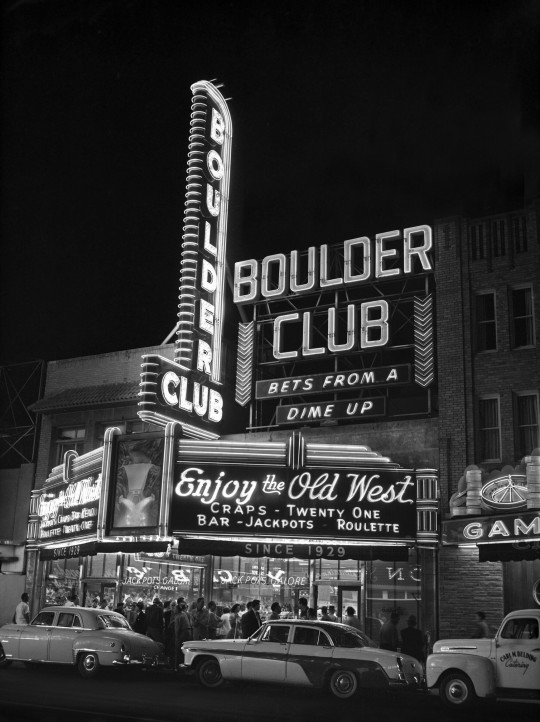
Boulder Club – Since 1929
Timeline of Boulder Club, 118 Fremont St, Las Vegas. Photo: 5/25/55, by Las Vegas News Bureau.
'29: Jul. 27, Boulder Club opens in a new 2-story building on Lot 18, Block 15, constructed “in a little over a month.” Boulder Club operates on the ground floor. The owners are Prosper J. Goumond, Clyde Hatch, J. V. Murphy, and Walter Watson, all from Ely. By the following year the owners are Goumond and A. B. Witcher. Throughout the history of Boulder Club, Goumond and Witcher are referred to as the founders. Neon sign by Bruce Brothers.
'31: Mar., Boulder Club is one of eight clubs to receive the first gaming licenses by the city and county under the new gaming law. (RJ 4/1/31)
'33: May, Second neon sign, with stein of beer. The sign is the first in Las Vegas by Young Electric (YESCO).
'35: Jan. 19, Boulder Club opens a Keno parlor. Some time later “Keno” is added to the neon sign.
'36: Oct., Clock added to sign (Review-Journal 10/12/36 p2:6).
'40: Mar., Boulder Club expansion into 120 Fremont (Lot 19, Block 15) also owned by Goumond & Witcher. The clock removed from sign and a horizontal “Boulder Club” marquee is added across 118-120 Fremont.
'45: Third sign, by YESCO, built from Jul.-Oct. The sign is bigger than the building, with a panel depicting water shimmering at Hoover Dam, and a theater style marquee hanging over the sidewalk. YESCO opens a Las Vegas shop for full-time maintenance of the sign. (Young Jr. Oral History)
'50: A new ownership corp. is formed with Goumond (president), Jim Young, Larry Hezzlewood, J.K. Houssels, Connie Hurley, and Lillian Witcher (widow of A. B.)
'51: “Boulder Club, Bets from a dime up,” rooftop sign.
'54: Nov. 24, Gouman dies; shares go to granddaughter Margo Goumond Hines.
'55, Oct: Ernest & Peter Amante head a group that take over Boulder Club, paying $800,000 and $4,000 monthly rent to property owners Hines and Witcher.
'56, Nov 25: Fire destroys the 2nd floor of the building, casino is closed. The fire is ruled arson.
'56, Dec 29: Boulder Club reopened.
'57, Apr: The sale to Amante bros is aborted, and Boulder is briefly closed. The former ownership form a new partnership with “Farmer” Milton B. Page heading the casino, and Boulder Club reopens Apr. 24. The gaming licensees are Hezzelwood, Houssels, Page, Young, the estate of Goumond (Margo G. Hines). The Boulder Club partners listed in print ads include Connie Hurley, Lillian Witcher, and Ross Page. “Farmer Page” is added to the top of the marquee, and the names Houssels, Page, Young, Hezzelwood on a drape below the marquee.
'60: Sep., Page dies on the 9th. Page’s widow and partners close the club 9/28/60. The property is leased to Horseshoe Club for their expansion. The building is demolished in Nov. As of the 2020s, Lots 18-19, Block 15, are leased to Binion’s Gambling Hall.
Photos of Boulder Club
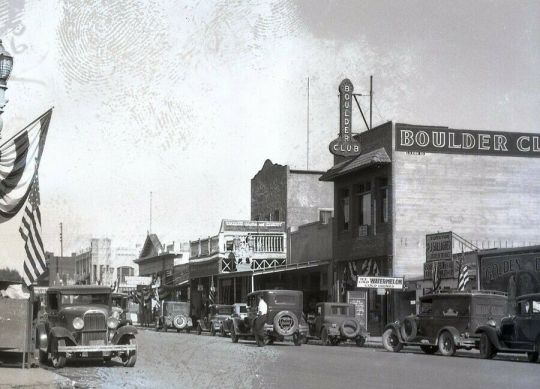
Sep. '30 – Boulder Club with its first sign. Flags on Fremont St for the dam dedication ceremony, 9/17/30.
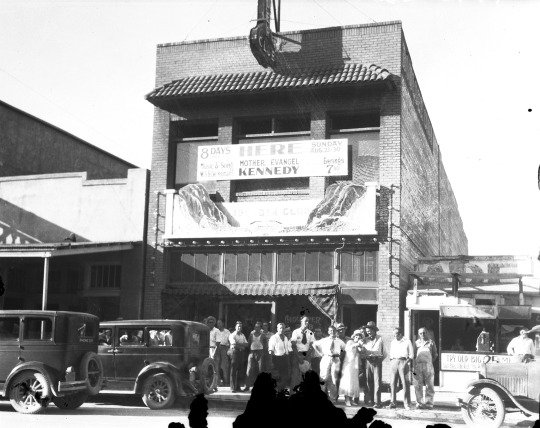
Aug. '30 – Banner for "Ma" Kennedy, mother of evangelist Aimee Semple McPherson, appearing at Boulder Club 8/23/30 to 8/30/30. Elton and Madelaine Garrett Collection (PH-00265) UNLV Special Collections & Archives.
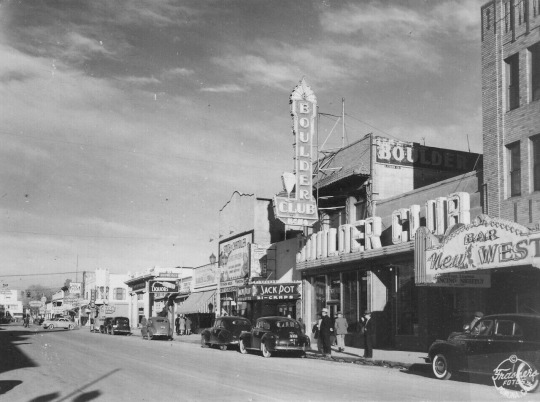
circa '43 – Boulder Club with '33 sign and '40 marquee. Postcard by Burton Frasher, Frasher Fotos.
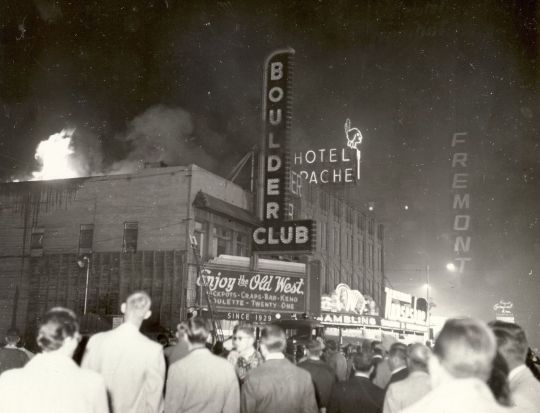
11/25/56 – Fire at Boulder Club.
New Sign Put on Boulder Club. Review-Journal, 7/12/29 p5; $60,000 Put In Boulder Club. Review-Journal, 6/27/29 p6; Slot Machines Barred Where Minors Loiter. Review-Journal, 4/1/31 p1; Boulder Club Has Giant Neon Sign. Review-Journal, 5/22/33 p2; Boulder Club to Double Size of Present Quarters. Review-Journal, 3/19/40; Boulder Club advertisement. Review-Journal, 10/20/45 p3; Boulder Club Is New Corporation. Review-Journal, 5/18/50 p2; PJ Gouman Dies in Vegas. Review-Journal, 11/24/54 p1; Fire Investigators Probe Cause. Review-Journal, 11/26/56 p1; Arson Found in Boulder Club Fire. Review-Journal, 11/29/56 p1; Boulder Club Open Saturday. Review-Journal, 12/30/56; Minutes, 4/11/57. Las Vegas City Commission Records (MS-00237), UNLV Special Collections & Archives; Partner. Review-Journal, 4/22/57 p14; Thomas Young Jr. oral history interview (OH-03255), UNLV Special Collections & Archives.
69 notes
·
View notes